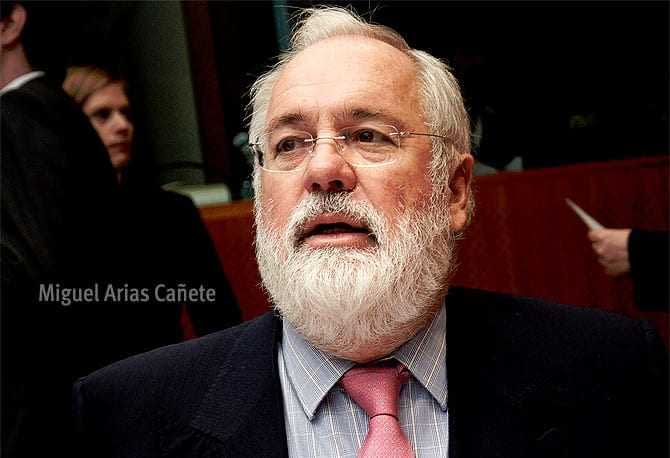Spain Gives General Backing to EU Olive Oil Action Plan

World olive oil capital Spain has indicated its broad support for a range of changes — including making best-before dates mandatory on labels — that could form part of the EU action plan for the struggling sector.
Requiring the use of non-refillable, labeled bottles for olive oil served in restaurants and some changes to organoleptic and chemical test methods are also among measures Spain agrees with.
Spain’s Agriculture Minister Miguel Arias Cañete, in a July 12 letter to European Commissioner for Agriculture Dacian Cioloş, said the draft action plan for the EU olive oil sector was regarded positively by Spain, but some aspects needed to be refined and there were some deficiencies, such as the lack of a dedicated budget for the plan.
Olive Oil Times recently obtained a copy of Arias Cañete’s letter under EU freedom of information rules. Released by the European Commission, the letter came with an eight-page document — both in Spanish — setting out Spain’s initial position on the plan, which Cioloş released in June for discussion.
Labeling and marketing regulations
The Cioloş proposals include holding a technical study before addressing the issue of best-before dates on olive oil labels, and pushing EU states to require the use of one-way olive oil packaging in the hospitality sector.
In its response, Spain said printing a best-before date on olive oil labels is a basic measure that it has been proposing to both the EU and the International Olive Council (IOC), but it should be based on scientific studies that take into account all factors that can cause changes in olive oil over time.
It said it “completely agrees” with the unrefillable bottles move and intends to require this as part of national regulations for edible vegetable oils but it should be made mandatory EU-wide.
Tougher paramaters don’t guarantee quality
The Cioloş draft said there were calls from some stakeholders for tougher chemical parameters for quality testing, and for improvements to the panel test.
Spain said any changes to parameters must be studied very carefully and based on solid scientific evidence. “Sometimes a restriction in the limits doesn’t result in better oils. Often the worst oils can scrupulously comply with the limits yet have major organolpetic defects,” it said.
Call for new tools to improve panel test
Spain said amid concerns from some in the sector who question its use, there should be research on how to “complement the panel test with physico-chemical methods that make the organolpetic method objective.”
It proposed including in the action plan a point on the need to improve the practical application of the test and to promote research on the development of “new means of quality analysis based on instrumental methods”.
International Olive Council
Spain said it agreed that in order to strengthen the role of the IOC, its membership should be open to consumer countries, not just producer ones.
And it called on the EU to “strengthen and exercise” its leadership in the IOC.
“Its presence has to be felt not only in debates and scientific input but also in the organization itself, where it must be more conspicuous.”
Quality control
Under a section in the Cioloş draft on short term action to protect the quality and authenticity of virgin oils, it was proposed that the IOC be asked to expedite its work in the following areas:
- Reduction of the stigmastadienes level
Spain said this parameter indicates the grade of purity of an oil and in that respect there’s need for caution, “because any reduction in the limit could pose problems for the monitoring of the purity of virgin oils.” If the level is to be lowered there should be a collaborative trial in labs across the EU to definitively determine the real limit, it said.
- Adoption of the global method for the detection of extraneous oils in olive oils
Spain said this method is approved by the IOC but not yet widely used. “It would solve many of the problems of blends with other oils, particularly the so-called ‘designer blends’ that meet legal requirements.”
- Reduction of the alkyl esters limit
This wouldn’t deter use of deodorized oils but it is very useful for preventing the use of lampante oils in blends. Good quality oils are usually under the limit so lowering it shouldn’t pose problems, Spain said.
- Adoption of a diglycerides and triglycerides test
“We believe it’s necessary to set some appropriate limits so that the method can be used to combat fraudulent blends and determine freshness,” was Spain’s only comment.
- Revision of the calculation of wax content
Spain sees this parameter as fundamental for the detection of pomace in fraudulent blends and of inferior oils derived from a second centrifugation.
It said there was currently consideration of reducing the limit “but there’s a need for much caution with certain varieties, such as arbequina, which behave differently to others.”
Other points made by Spain included:
- the consumption of olive oil should be promoted in schools in a similar way to the EU fruit and vegetables scheme
- the private storage aid scheme for olive oil should be revised and a similar scheme provided for table olives
- self-regulation measures should be considered for the olive oil sector, including allowing it to remove surplus from the market.
Key aspects of the Cioloş plan are on the agenda for a December 11 meeting of the European Commission Management Committee for the Common Organisation of Agricultural Markets. Among proposed changes to be discussed are labeling, one-way packaging in the hospitality sector, private storage aid rules, and regulations on the characteristics of olive oil and methods of analysis.



